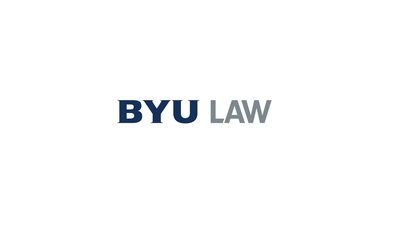BYU Law Hosts 9th Annual Law and Corpus Linguistics Conference
Includes discussions on the use of AI to interpret the law, CL analysis through expert testimony
PROVO, Utah, Oct. 16, 2024 /PRNewswire/ -- BYU Law today announced it will hold its ninth annual Law and Corpus Linguistics Conference on October 25. The event, sponsored by Schaerr Jaffe, LLP, BYU College of Humanities and the Judicial Education Institute, will convene prominent legal and linguistics scholars, judges and industry professionals interested in furthering the discipline of corpus linguistics – the method of understanding the ordinary meaning of words at the time they were written by analyzing language in large collections of texts called "corpora."
Keynote addresses will be delivered by Edward Finegan, Professor Emeritus of Linguistics and Law at the University of Southern California, and Lawrence Solum, the William L. Matheson and Robert M. Morgenthau Distinguished Professor of Law at the University of Virginia. Solum's keynote is titled, "Pragmatics and Corpus Linguistics." Finegan's address is titled "Corpus Linguistics in Trademark and Defamation Cases."
This year's conference will also feature a discussion of the potential use of AI-powered large language models (LLMs) in assessing the ordinary meaning of words—a topic raised recently by law scholars and implemented in concurring opinions by Judge Kevin Newsom of the Eleventh Circuit (in Snell v. United Specialty Insurance Co. and United States v. DeLeon). A key academic paper is Asking GPT for the Ordinary Meaning of Statutory Terms, co-authored by University of Chicago Law Professor Richard McAdams. A response piece, titled Artificial Meaning?, was co-authored by BYU Law Professor Thomas Lee and Northern Arizona University Linguistics Professor Jesse Egbert. Professors McAdams, Lee and Egbert will present their papers in a plenary session at the conference.
"We look forward to the dialogue with Professor McAdams about the cutting-edge intersection between AI and corpus linguistics," said Thomas R. Lee, BYU Law professor and retired Utah Supreme Court Justice. "And we are honored to host a conference in which the best linguistic and legal minds will join together in discussing best practices in this important field."
Here is the link to the conference registration. A schedule is available here.
Marvin Quattlebaum Jr., Judge of the United States Court of Appeals for the Fourth Circuit, will present an article on corpus linguistics analysis through expert testimony – an important topic and under-developed aspect of scholarship. Judge Quattlebaum has used corpus linguistics in an opinion for the Fourth Circuit.
On Thursday, October 24 from 9 a.m. to noon (MDT), an Introduction to Corpus Linguistic Applications to Law Workshop will be offered for any linguists attending the conference. This workshop will be led by law faculty and linguists and will provide an introduction to the field of law as well as describe issues that those in the legal field often encounter that corpus linguistics has been or could be used to address.
About BYU Law & Corpus Linguistics
In addition to hosting this annual conference, BYU Law develops pioneering legal research corpora and fosters influential scholarship and training using corpus linguistics. Its law and corpus linguistics platform has been used by thousands of researchers, including federal and state judges, and appellate attorneys. The platform enables legal professionals to analyze the meaning of words that can be applied to current cases. More than 146 legal opinions have referenced corpus linguistics since 2011, including the recent decision in United States v. Robinson (4th Cir. Feb. 13, 2024) in which corpus linguistics is used to support an interpretation of "strangulation."
About BYU Law School
Founded in 1971 with its inaugural class in 1973, the J. Reuben Clark Law School (BYU Law) has grown into one of the nation's leading law schools – recognized for innovative research and teaching in social change, transactional design, entrepreneurship, corpus linguistics, criminal justice and religious freedom. The Law School has more than 7,000 alumni serving in communities around the world. BYU Law is consistently ranked by National Jurist as one of the best-value law schools in the country. BYU Law is also one of only six law schools to receive the Bloomberg Law School Innovation recognition. BYU Law seeks to "develop people of integrity who combine faith and intellect in lifelong service to God and neighbor." For more information, visit https://law.byu.edu.
![]() View original content to download multimedia:https://www.prnewswire.com/news-releases/byu-law-hosts-9th-annual-law-and-corpus-linguistics-conference-302277078.html
View original content to download multimedia:https://www.prnewswire.com/news-releases/byu-law-hosts-9th-annual-law-and-corpus-linguistics-conference-302277078.html
SOURCE BYU Law

 Index Options
Index Options CME Group
CME Group Nasdaq
Nasdaq Cboe
Cboe TradingView
TradingView Wall Street Journal
Wall Street Journal